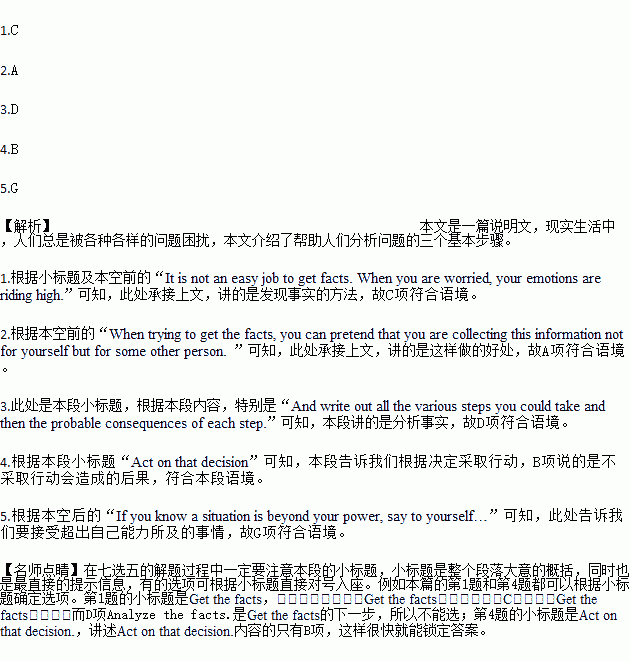题目内容
One of the common complaints we hear from the people around us are problems they are facing. Every day and everywhere there are problems. Many times we find it hard to stay happy. When one problem is solved, another one comes up. How to solve them? The answer is that we must equip ourselves to deal with different kinds of worries by learning the three basic steps of problem analysis. The three steps are:
Get the facts
Why is it so important to get the facts? Unless you have the facts, you can’t possibly attempt to solve your problem intelligently. Without the facts, all you can do is wondering around in confusion. It is not an easy job to get facts. When you are worried, your emotions are riding high. 1.
When trying to get the facts, you can pretend that you are collecting this information not for yourself but for some other person. 2. You can also pretend that you are a lawyer preparing to agree. Try to get all the facts both on your side and the other side of the case. You will generally find the truth lies somewhere in between.
3.
Whenever you are worried, write down the questions that make you worry. And write out all the various steps you could take and then the probable consequences of each step. For example, what am I worrying about? What can I do about it? Here is what I’m going to do about it. After carefully weighing all the facts, you can calmly come to a decision.
Act on that decision.
4. How can you break the worry habit before it breaks you? Crowd worry out of your mind by keeping busy. Plenty of action is one of the best ways to cure worry.
5. If you know a situation is beyond your power, say to yourself: “It is so; it can’t be otherwise.” Don’t permit little things to ruin your happiness. Try to cultivate a mental attitude that will bring you peace and happiness.
A. This will help you to take a cold and fair view of the evidence.
B. Unless you take your action, all your fact-finding and analysis is a sheer waste of energy.
C. But here are two ideas that can help you see the facts in a clear and objective way.
D. Analyze the facts.
E. There comes a time when you must decide and never look back.
F. Decide how much anxiety a thing may be worth.
G. Accept what can’t be avoided.

